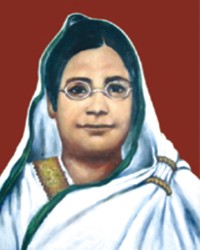Perspective
On Rejecting Feminism
Misconceptions about feminism make it an unnecessarily controversial issue.
Kajalie Shehreen Islam
Ask a room full of people -- women and men; educated; politically, culturally and socially aware,

Raja Rammohan Roy fought to abolish sati, the practice of burning a widow on her husband’s funeral pyre. |
maybe even activists -- whether they are 'feminists' and the general answer will be a somewhat defensive, somewhat confused, 'no'.
Why not? Why is feminism such a 'bad' word? Even in the 'developed and highly liberal' west, feminism is often equated with ugly, aggressive, man-hating women; homosexual women against marriage, motherhood and everything else that is 'normal'. For those not as (adversely) into it, feminism is irrelevant -- a white, middle-class phenomenon.
In our country and larger sub-continent too, the concept is associated with 'modern', 'western', upper- to middle-class, educated women. They are the more visible ones in rallies, conferences and the media, their social positions combined with their eloquent articulation bringing them to the forefront. Less common is the image of feminism as reflected in the rural female adolescent who demands an education; the woman who chooses to work or even the woman who chooses not to; the woman who rejects the purdah as well as the woman who chooses to cover herself -- as long as the choice is her own. Basically, nowhere is feminism widely seen to be concerned with the actual subject of the whole discourse -- regular, everyday women demanding equality.
This is where the confusion begins. As soon as you quote American writer, social activist and, yes, feminist, bell hooks (Gloria Jean Watkins) who said feminism is 'a movement to end sexist oppression', people are forced to start thinking about a concept they had so easily and naively rejected.
Indian feminist and gender trainer Kamla Bhasin has described feminism as 'an awareness of women's oppression and exploitation in society, at the place of work and within the family and conscious action to change this situation'. She has elaborated on oppression and exploitation as being at the 'material and ideological levels of women's labour, fertility and sexuality, in the family, at the place of work and in society in general'.
Yet another very crisp and concise definition can be found on posters and other advocacy material -- 'feminism is the radical notion that women are people'.

Rokeya Sakhawat Hossain was a champion of women’s rights and gender equality. |
These definitions embrace anyone aware of and active against discrimination based on gender. They include every woman who has ever felt discriminated against based on the fact that she is a woman and who has tried to say or do something about it. They also include all men who are conscious of and vocal about such discrimination. Men can be feminists too, just as not all women are feminists. These definitions may just make those who claim not to be feminists a little uncomfortable.
Feminism is a flexible concept. Its issues change over time and place, based on the situation of women in those times and places. It also varies between women, depending on their background, class, level of education, consciousness, etc., for these are what set the needs, demands and priorities of people. Feminism has gone from being about democratic and political rights such as the right to vote, right to education, employment, etc., to rights within the home and family. Kamla Bhasin defines present-day feminism as the struggle for equality, dignity and freedom of choice for women within as well as outside the home. After having fought for decades for the former rights within the public sphere, the focus is now on the private, such as domestic violence. But, as the famous feminist slogan goes, 'the personal is political', each having an effect on the other. Domestic violence is one of the most obvious examples, where 'private' violence has an influence on public legislation and, of course, vice versa.
The perception of 'radicalism' is perhaps one of the reasons that feminism is rejected by many; but a more common and underlying cause -- be it for patriarchs, capitalists, religious leaders, the military establishment, etc. -- is the threat of feminism upsetting the status quo. As some claim, 'patriarchy was going on fine until feminism came along'. The key problem, after all, is not in some individual man (or woman), but in the system, which produces, perpetuates and reproduces inequality.
Feminists are against patriarchy and male domination, but they do not all hate men and their goal is not to replace them with matriarchy, for they oppose hierarchies of any sort, writes Kamla Bhasin on feminism. They are not against marriage, motherhood and family but the inequality often found within them. There are radical, liberal, Marxist, eco-feminism and a range of other types of feminisms. Islamic feminism, for example, brings in a feminist interpretation of the religion, questioning the established patriarchal interpretation and aiming for equality of all Muslims irrespective of gender. Different schools of thought focus on different causes of the oppression of women, ranging from patriarchy to capitalism to human domination over nature. For some, the concept of feminism has even been replaced by 'post-feminism', the idea that feminism has achieved its goals and is no longer relevant in today's world.
Despite the common image of a feminist as a verbally aggressive, promiscuous woman with short hair who smokes and writes bold and provocative poetry or prose, these qualities are not what define feminism. Feminism is not about a lifestyle choice but a political stance. Neither is the true meaning of feminism reflected by those who give animated speeches on equal rights at seminars and go home and abuse their domestic workers.
Rokeya Sakhawat Hossain and Raja Rammohan Roy are perhaps some of the brightest names and most ideal examples of feminists in the sub-continent though 'feminist' may not be the first label they are immediately ascribed with. What they were fighting for was not extreme, but what was just. Feminism is a political position, but not one that benefits one group of women over another, or even which privileges women over men. Simply put, it is about eliminating inequality and injustice.
Some argue that, by focusing on women, the whole idea of feminism creates divides between women and men and that it isolates women from the mainstream, from 'human beings'. For others, who believe that women have been isolated from the rest of humanity at the very outset, feminism is this very struggle for recognition of women as humans, too. If at one extreme we have patriarchy, perhaps having feminism at the other is simply an attempt to reach a negotiated and balanced centre -- a gender egalitarian society -- as the ultimate, perhaps utopian, goal. Surely this is a more acceptable approach to feminism?
Copyright
(R) thedailystar.net 2009 |
